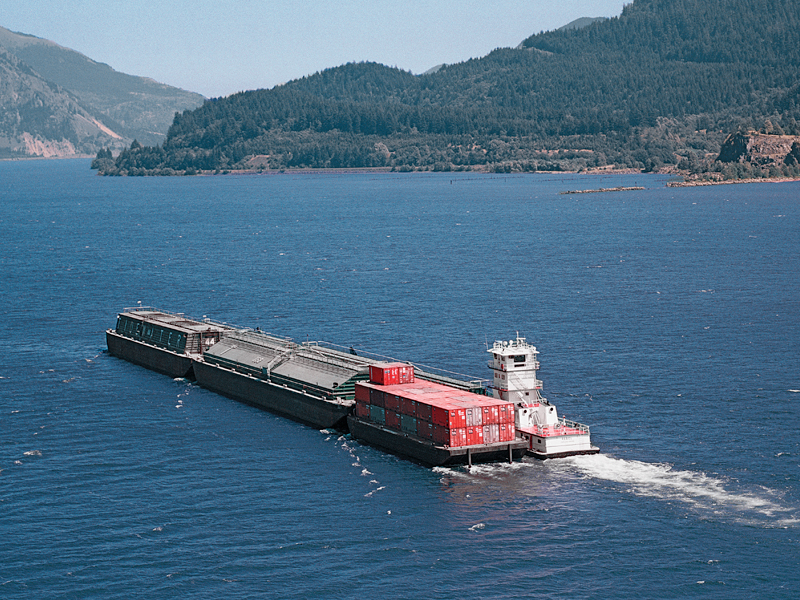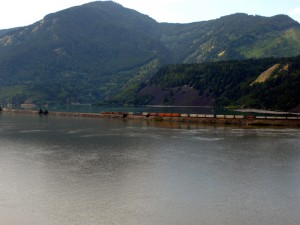
Container barge service is back on the upper Columbia and Snake rivers. The Upriver Container Barge-Rail Shuttle will help importers and exporters in eastern Washington, Oregon and Idaho move containerized agricultural products to markets in Asia. An informal partnership including Northwest Container Service, Tidewater Barge and the ports of Morrow, Lewiston and Portland helped facilitate the return of this service. The first barge is currently loading at the Port of Lewiston this week and expected to get underway Thursday.
 The new service would address key issues driving up the cost of transportation in the wake of losing direct carrier service at Terminal 6 in Portland earlier this year— loss of barge service, container availability and cost of trucking to Puget Sound ports. The planning for the return of container barge service started in summer 2015, and required commitments from multiple transportation providers and key exporting companies to make the service viable.
The new service would address key issues driving up the cost of transportation in the wake of losing direct carrier service at Terminal 6 in Portland earlier this year— loss of barge service, container availability and cost of trucking to Puget Sound ports. The planning for the return of container barge service started in summer 2015, and required commitments from multiple transportation providers and key exporting companies to make the service viable.
Empty containers began arriving at the Port of Lewiston in October, now filled with agricultural and paper commodities from Idaho and Washington are ready to be barged to the Port of Morrow in Boardman, Ore. The barge service will continue to carry empties up river and return full every two weeks. In Boardman, these commodities will be combined with Oregon agricultural and paper products and taken by train to the Northwest Container Service yard in Portland, Ore. From there, containers will either remain in Portland for export through T-6 on Westwood Shipping vessels, or continue by rail to seaports in Seattle and Tacoma.
“I am pleased that the Port of Portland and regional shipping partners are offering creative solutions to challenges Oregon businesses face in getting goods to market,” Oregon Governor Kate Brown said. “Having completed my first trade mission to Asia, it’s clear there is a growing interest in Oregon products, particularly agricultural products.”
The Container Barge-Rail Shuttle provides a cost-effective alternative to over-the-road shipping to Puget Sound ports and utilizes river and rail assets in the region. The primary beneficiaries of this service are shippers of peas, beans, lentils, hay and paper products—high volume, economically impactful commodities for rural Oregon communities that rely on low cost barge/rail transport.
The project is the outgrowth of work the Port of Portland and the State of Oregon took on with shipping companies across the state to find alternate routes to market until weekly transpacific container service resumes at T-6. The Port of Portland contributed $51,000 in seed money to kick start the Container Barge-Rail Shuttle project and offset the additional cost of transferring agricultural products from the barge to rail in Boardman. The shuttle is expected to be self-sustaining by the second full month of service. Once established, rail service from Boardman is expected to increase to weekly as additional importers and exporters participate in the program.
With the withdrawal of Hanjin and Hapag-Lloyd weekly transpacific service at T-6, container barge service on the Columbia-Snake River system and the container terminal in Lewiston, Idaho shut down. Currently, Westwood Shipping provides monthly container service from T-6 to Asia. To accommodate other exporters, Northwest Container Service increased rail service from Portland to Puget Sound Ports. The remainder of regional export shipping needs is absorbed by an already congested highway system as trucks move cargo to other seaports.
Although an important part of the freight solutions equation, based on historical trade volumes, these two providers alone cannot address the gaps in capacity after Hanjin and Hapag-Lloyd pulled out.
“We appreciate this kind of ‘out of the box’ thinking from all parties involved, providing a partial solution to shipping challenges while we continue working to recruit critical new transpacific service,” said Port of Portland Executive Director Bill Wyatt. “We hope the success of this plan will entice labor and terminal management to come together in agreement sooner and shippers to resume frequent, regular container service.”
Recruitment of new transpacific service is critical to our region and is a priority for the Port of Portland. The Portland region cargo market of 336,000 TEUs has the potential to support two weekly non-competing, transpacific container carriers. The Port of Portland recently began targeted outreach to four target carriers that can serve Oregon’s key international markets (Japan, China, and Korea). Resolution of the T-6 productivity issues will be critical to recruitment of new service.
